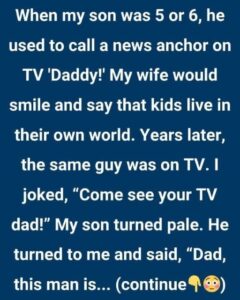
When my son Tomas was about five years old, he’d sometimes point at a news anchor on TV and shout, “Daddy!” I used to laugh it off as childish confusion—until years later, when he saw Rafael Medina on screen and quietly said, “I think he’s my real dad.”
That night, my wife Clara finally confessed. Before meeting me, she had dated Rafael, never told him about the pregnancy, and chose the stability I offered instead. Her words changed everything in an instant.
The revelation rippled through our home. Tomas began withdrawing, spending hours watching old videos of Rafael online. I tried to reassure him, saying, “Even if I had known back then, I’d still choose to be your dad.” He only asked, “Do you think he’d care if he knew?”
We reached out discreetly. Rafael responded politely but without warmth—he said he barely remembered Clara. Tomas, still clinging to hope, once waited outside the TV station just to catch a glimpse of him. Rafael never noticed. Seeing the light fade from my son’s eyes that day broke something inside me.
So I went to see Rafael myself. I handed him a photo of Tomas holding a science fair trophy and said, “He thought you might be proud.” Rafael sighed, muttered something about not wanting complications, and walked away.
That night, I came home and held Tomas tight. Over time, he stopped chasing after a man who didn’t want to be found. We built our own rhythm again—bike rides, chess matches, quiet talks under the porch light. One evening, through tears, he told me, “You’re my real dad.”
Years later, when Tomas wrote his college scholarship essay, he titled it “The Man Who Stayed.” I keep a copy of it in my desk drawer, next to his baby bracelet—a reminder that being a father isn’t about blood. It’s about showing up, again and again, no matter what.